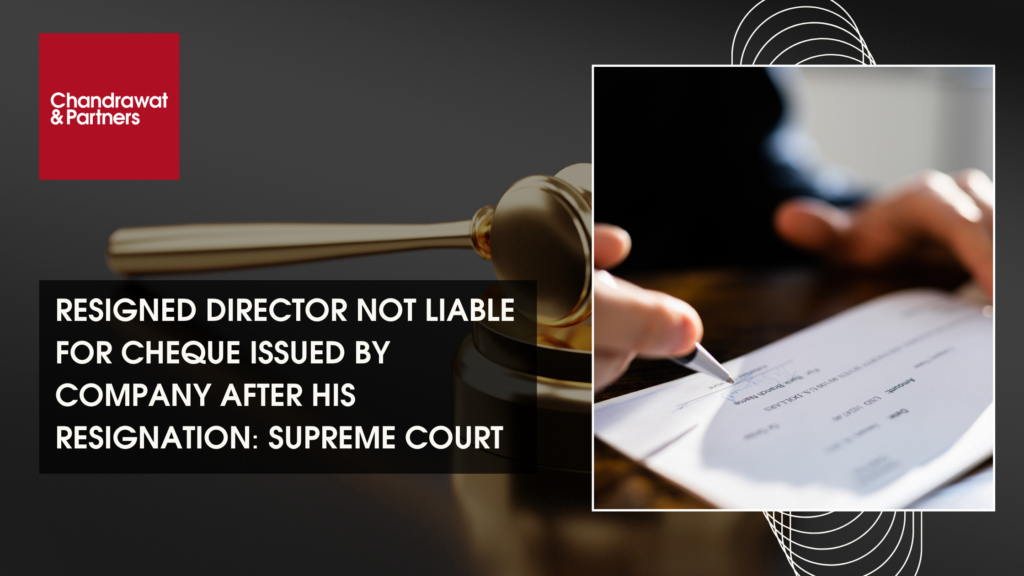Home > Recent Judgements > Resigned Director Not Liable For Cheque Issued By Company After His Resignation: Supreme Court
Jan 21, 2025
INTRODUCTION
In a groundbreaking decision, Adhiraj Singh v. Yograj Singh and Others Supreme Court bench redefined the boundaries of director liability under the Negotiable Instruments Act. The court unequivocally ruled that a director cannot be held responsible under Section 138 of the Negotiable Instrument Act, (“NI”) 1881 for actions taken by the company after their resignation.
BACKGROUND
The appellant, a former director of the respondent company, resigned his position before three company cheques were issued and subsequently dishonored. Despite his resignation, Appellant was included in the criminal proceedings initiated under the Negotiable Instruments Act. Appellant argued that he was no longer responsible for the company’s affairs at the time of the cheque issuances. However, the Himachal Pradesh High Court dismissed his petition to quash the proceedings, prompting him to appeal to the Supreme Court.
PROVISIONS INVOLVED IN IT
Section 141 of the Negotiable Instruments Act, 1881, deals with the liability of directors of a company in case of dishonor of a cheque issued by the company. This provision holds directors personally liable for the dishonor of a cheque issued by the company if the cheque is issued for the purpose of meeting any debt of the company. However, directors can escape this liability by proving that the dishonor occurred without their knowledge or that they exercised due diligence to prevent such dishonor.
KEY ISSUES
- Can a director who has resigned from a company prior to the issuance of dishonored cheques be held vicariously liable under Section 141 of the NI Act?
- Does the existence of a debt during the tenure of a director create continuing liability after their resignation?
JUDGEMENT AND OBSERVATION
In the specific case, the appellant had resigned from their position within the company with immediate effect on June 21, 2019. The Registrar of Companies subsequently acknowledged this resignation on June 26, 2019. Crucially, the cheques in question were issued on July 12, 2019, a period after the appellant’s disassociation from the company. The Court rejected arguments to the contrary, asserting that a director’s resignation effectively terminates their involvement in the company’s affairs. Consequently, the issuance of cheques subsequent to the resignation precludes any potential vicarious liability under Section 141. The Court emphasized that liability under Section 141 is contingent upon a person being in charge of and responsible for the company’s business during the commission of the offense. Notably, the Court clarified that the offense under Section 138 (relating to dishonor of a cheque) arises when the cheque is dishonored, not at the inception of the underlying debt.
The respondents cited the Malva Cotton case, where a director’s resignation was deemed ineffective due to its non-filing with the Registrar of Companies prior to cheque issuance. The Court differentiated the present matter, emphasizing that the appellant’s resignation was duly filed with the Registrar before the issuance of the disputed cheques. Consequently, the Malva Cotton precedent was deemed inapplicable.
The Court reaffirmed that Section 141 liability requires specific allegations substantiated by concrete evidence demonstrating the accused’s active involvement in the company’s affairs during the relevant period. Simply asserting the appellant’s directorship at the time, the debt arose was deemed insufficient to establish vicarious liability for cheque dishonor occurring post-resignation.
CONCLUSION
The Supreme Court’s 2025 judgement provides valuable clarity on the liability of directors under Section 141 of the NI Act for post-tenure cheque issuances by the company. It underscores the importance of a nuanced and fact-specific approach to determine liability. This judgement has significant implications for company directors, as it clarifies the scope of their potential liability and provides guidance on mitigating risks associated with post-resignation company actions.
For more information or queries, please email us at
[email protected]





